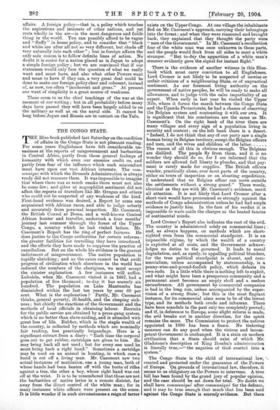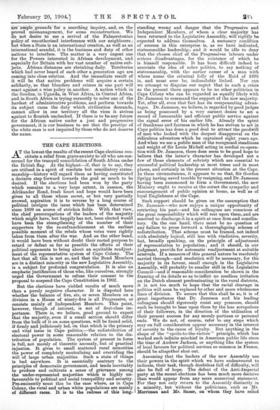of affairs in the Congo State is not pleasant reading.
For some years Englishmen have felt considerable un- easiness at the reports of misgovernment and barbarities in Central Africa, partly from those general feelings of humanity with which even our enemies credit us, and partly from fear of the influence which such misconduct must have upon our vast African interests. The com- munique with which the Brussels Administration is always ready did not reassure them. It was impossible to imagine that where there was so much smoke there must not also be some fire ; and gibes at negrophilist sentiment did not affect the reports of travellers like Mr. Grogan and others who could not be suspected of any weakness of the kind. First-hand evidence was desired, a, Report by some one acquainted with African races, and able to judge soberly and accurately from personal inspection. Mr. Casement, the British Consul at Boma, and a well-known Central African hunter and traveller, undertook a four months' journey last summer through the forest of the Upper Congo, a country which he had visited before. Mr. Casement's Report has the ring of perfect fairness. He does justice to the Congo authorities for certain reforms : the greater facilities for travelling they have introduced, and the efforts they have made to suppress the practice of cannibalism. But on the whole his evidence is the gravest indictment of misgovernment. The native population is rapidly shrinking; and as the cause cannot be that swift progress of civilisation which elsewhere in the world has reduced the numbers of the aborigines, we must accept the sinister explanation. A few instances will suffice. Lukolela, when Mr. Casement visited it in 1887, had a population of five thousand ; to-day it has scarcely six hundred. The population on Lake Mantumba has diminished within the last ten years by over 60 per cent. What is the explanation ? Partly, Mr. Casement thinks, general poverty, ill-health, and the sleeping sick- ness ; but chiefly the exactions of the Government and the methods of local officials in obtaining labour. Recruits for the public service are obtained by a press-gang system, which is no better than slave-raiding, and is attended with great loss of life. Rubber, which is the staple wealth of the country, is collected by methods which are nominally fair trading, but practically brigandage. Here is a significant extract from a diary : " Each time the corporal goes out to get rubber, cartridges are given to him. He may bring back all not used ; but for every one used he must bring back a right hand." Sometimes a cartridge may be used on an animal in hunting, in which case a band is cut off a living man. Mr. Casement saw two actual instances of mutilation, one a young man, both of whose hands had been beaten off with the butts of rifles against a tree, the other a boy, whose right hand was cut off at the wrist. It is to be remembered that those are not the barbarities of native levies in a remote district, far away from the direct control of the white man ; for in many instances white officers were present on the scene. It is little wonder if in such circumstances a reign of terror exists on the Upper Congo. At one village the inhabitants fled on Mr. Casement's approach, carrying their belongings into the forest; and when they were reassured and brought back, they explained that they thought the party were " men of the Government." In Mr. Casement's recollection fear of the white man was once unknown in these parts, and the people would flock from all sides to meet a white stranger. " But to-day the apparition of a white man's steamer evidently gave the signal for instant flight."
There is the evidence of another witness in this Blue- book which must carry conviction to all Englishmen. Lord Cromer is not likely to be suspected of unwise or unfair criticism of a neighbouring State, or of unpractical sentiment. As our foremost living authority on the government of native peoples, he will be ready to make all allowances, and to judge with the calm impartiality of an expert. When early in last year he visited the Upper Nile, where it forms the march between the Congo State and the Uganda Protectorate, he had a chance of observing the Belgian system and contrasting it with our own. It is significant that his conclusions are the same as Mr. Casement's. On the right bank of the river there are many villages and every sign of a population living in security and content; on the left bank there is a desert "Indeed, I do not think that any of our party saw a single human being in Belgian territory, except the Belgian officers and men, and the wives and children of the latter The reason of all this is obvious enough. The Belgians are disliked. The people fly from them, and it is no wonder they should do so, for I am informed that the soldiers are allowed full liberty to plunder, and that pay- ment is rarely made for supplies. The British officers wander, practically alone, over most parts of the country, either on tours of inspection or on shooting expeditions. I understand that no Belgian officer can move outside the settlements without a strong guard." These words, identical as they are with Mr. Casement's evidence, merit all attention. It is not likely that Lord Cromer after a short visit would have pronounced so strongly against the methods of Congo administration unless he had had ample evidence to justify him. In the face of his verdict it is impossible to wave aside the charges as the heated fancies of sentimental minds.
Lord Cromer's Report also indicates the root of the eviL The country is administered solely on commercial lines;'. and, as always happens, on methods which are short- sighted even from the commercial standpoint. It is an impossible regime, by which the wealth of a country is exploited at all costs, and the Government acknow- ledges no duties to the governed. It leads to moral degradation, and, as swely, to appalling political blunders, for the true political standpoint is absent, and com- mercialism, unless accompanied by statesmanship, is a penny-wise-and-pound-foolish policy, which defeats its own ends. In a little while there is nothing left to exploit, and what might have been a prosperous community and a permanent asset becomes an empty shell and a useless encumbrance. All government by commercial companies is bad in the long run, unless accompanied by the super- vision .of a strong State; but this is the most flagrant instance, for its commercial aims seem to be of the lowest type, and its methods both crude and inhuman. There have been scandals in the past only too completely proved; and if, in deference to Europe, some slight reform is made, the evil breaks out in another direction, for the spirit remains the same. The Commission to protect the natives appointed in 1896 has been a fiasco. No tinkering measure can do any good when the vicious and incom- petent Government is unchanged. It is a stain on modern civilisation that a State should exist of which Mr. Gladstone's description of King Bomba's administration is literally true,—" the negation of God erected into a system."
The Congo State is the - child of international law, created and protected under the guarantee of the Powers of Europe. On grounds of international law, therefore, it seems to us obligatory on the Powers to intervene. A true bill has been found by the grand jury of popular opinion, and the case should be set down for trial. No doubt we shall have communique after communiqué for the defence, and it may be true enough that much that has been said against the Congo State is scarcely evidence. But there are ample grounds for a searching inquiry, and, on the proved mismanagement, for some reconstruction. We do not desire to see a revival of the Palmerstonian policy of unauthorised interference with our neighbours ; but when a State is an international creation, as well as an international scandal, it is the business and duty of other nations to interfere. The matter is a, very urgent one for the Powers interested in African development, and especially for Britain with her vast number of native sub- jects. African distances are shrinking daily. Territories which had never heard of each other a generation ago are coming into close relation. And the immediate result of it will be that native problems will acquire a certain solidarity, 'so that blunders and crimes in one part will react against a wise policy in another. A nation which in the Soudan, in 'Uganda, in West Africa, in Central Africa, and in South Africa is trying earnestly to solve one of the hardest of administrative problems, and perform towards its subject races the duty which civilisation demands, cannot allow in one territory all the vices it strives against to flourish unchecked. If there is to be any future for the African native under a just and progressive government, it is our business to see that the prestige of the white man is not impaired by those who do not deserve the name.











































 Previous page
Previous page